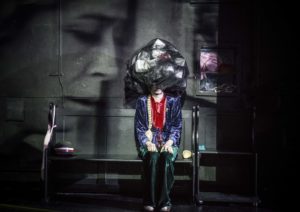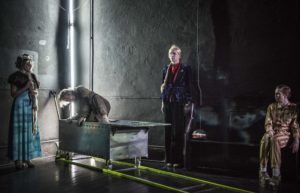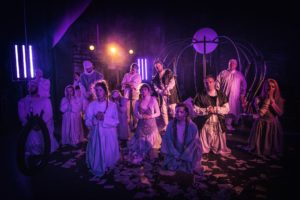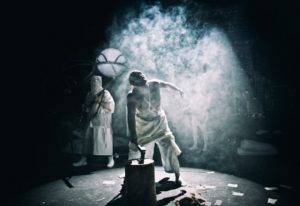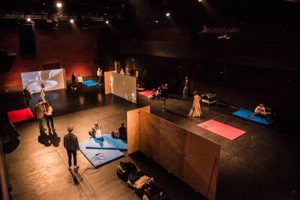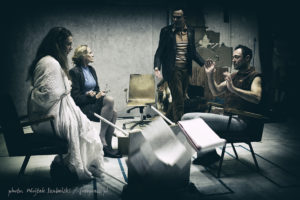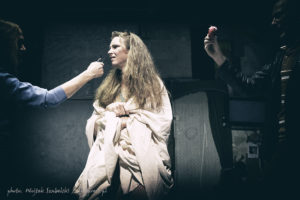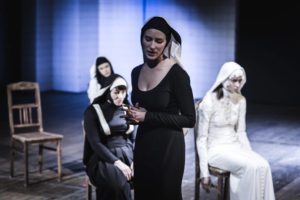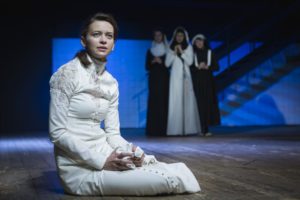I „Puppenhaus. Treatment” – Dir. Jędrzej Piaskowski – TR Warszawa
They would be referred to as “traitors to the country”, “collaborators”, and “renegades.” They had intimate relationships with German soldiers during the occupation. Actors, singers and the stars of cinema and cabaret. Did they really deserve the infamy and punishment inflicted on them by the underground? What were their motivations? Do we have the moral right to judge them today?
In their production, the playwright Magda Fertacz and director Jędrzej Piaskowski explore treason and collaboration from the perspective of individual memory. The script is partly based on the life of Maria Malicka, a famous pre-war Warsaw actress for whom a theatre was built at ul. Marszałkowska 8. Accused of collaboration with the Germans at the time of occupation, the artist was banned from performing in Warsaw after the war.
Another inspiration for the play is Arletta, or Leonie Bathiat, a famous French film and theatre actress of the 1930s and 1940s, who had had wartime liaisons with German officers and had been imprisoned before relaunching her national career, as well as the story of Deutsches Filmtheater operating during the German occupation of Poland in the building of Teatr Rozmaitości, and Mon Café, the establishment at Aleje Jerozolimskie before and during WWII frequented by Warsaw’s homosexuals.
By constructing a theatrical fantasy about wartime, the artists are asking questions about stigmatisation, punishment and judgment of individuals who, for a variety of reasons, renounce heroism and refuse to fight and make sacrifices for their country. How is historical memory and the moral judgment of past choices and actions constructed? What are the limits to interpreting and fantasising about the history that contains trauma and heroism? How can collective memory be healed?
From the review:
“’Puppenhaus. Kuracja” by Jędrzej Piaskowski (…) is based on historical specifics yet it is also a repetition of each of the histories. The history qualified with epithets: the one of the WWII, and the history free from epithets. The war for heroism and the lack of it, the battle for the right to tell lies or to tell the truth, to be brave or hypocritical. Jędrzej Piaskowski tenderly, this is probably the best term, collects the stories about pre-war cases of ostracism, the war struggle between lust and reason, and the canny bitches at the solarium of Adolf H., showing them with no touch-up. This is why one watches the performance, the dance-show and the phantom-performance with increasing unrest […]. The most improtant moment of the performance? In the performance about the bitches of the WWII, the countesses of pleasure and the guzzlers of despair, the climax belongs to the Young Insurgent played by Lech Łotocki. The old, huge child, brave and distant, forgotten, anonymous and incorporeal. A boy man, a vampire man. A symbol of other romantic vampires. The insurgent has got lost within the historical stitch, got out of ruins and got onto an everlasting scaffolding. Within the interstice of history, he hits on a handsome boy played by Sebastian Pawlak. The boy is clad in a uniform; the boy has an SS-Mann’s glitter in his eye; this boy’s hands are trembling. Hasn’t he got sweaty? And the Łotocki’s Insurgent? He is seeking, manoeuvring, responding to himself or not. He sheds his gender lining and comes back to his place. He is serious and he is distanced. The Young Insurgent has got stuck in the great history – on the monuments, in the memories and the museums. But where is his heart, where are his genitals? He felt Poland within himself, because his urges were Poland, too. Poland is not just “Rota” and Maria Konopnicka; this is privacy, too. It is not just slogans and politics, but it is also the suction and forcing pump. Wyspiański would put it better.”
Łukasz Maciejewski, AICT
“The story of cursed love – drawing upon the biography of a pre-war film star Maria Malicka, accused of collaboration, and the drama by Djordje Lebovic “Lutka sa kreveta br. 21,” leaves a lump in your throat. It is primarily thanks to the witty text form Fertacz and the outstanding actors. Playing a camp guard, Justyna Wasilewska seeks to cleanse the memory of her heroine, who had survived Auschwitz because she had been a prostitute. The play also features Sebastian Pawlak in the role of Hanka, a Polish girl who could not forsake her love for a German airman. “Let’s flee this history,” the words of the Young Insurgent (outstanding Lech Łotocki), a prospective martyr, tragically in love with a handsome German soldier, reverberate like a horrifying refrain. However, as the artists show us, there is no way to escape this weird nightmare. The best actor is Agnieszka Żulewska, who plays the cursed film goddess. Ironic and authoritarian when she invites us to master workshops on playing martyrdom. Poignant as a bitter elderly lady on a wheelchair, she tells bored young provincial folks what war is and why nobody has the right to judge her.”
Michał Centkowski, Newsweek”
“’Puppenhaus’ might be viewed as a show about sexual collaboration at the time of war. In Poland, this phenomenon is extremely tabooed, and the details not conducive to clear judgements have been razed to the ground with the road roller of history. As part of a group of artists, Piaskowski and Fertacz expose the actions aimed at affecting our knowledge and memory for the sake of keeping the narratives correct. They turn memory and the concept of truth inside out in order to expose the relativism that is incorporated into them. One can also think of “Puppenhaus” as a play that dissects the myth of collaboration, including collaboration that the current government tries to track down by digging through the “folders.” It can also be thought of as a play about love. Or a play about healing trauma and terror within collective memory that come with poster heroism.”
Anka Herbut, Dwutygodnik.com
TR Warszawa
„Puppenhaus. Treatment”
Direction: Jędrzej Piaskowski
Text: Magda Fertacz
Stage design: Aleksandr Prowaliński
Lighting direction: Aleksandr Prowaliński
Video: Marta Nawrot
Costumes: Hanka Podraza
Music: Jan Tomza-Osiecki
Choreography: Mikołaj Karczewski
Assistant Director: Wojciech Sobolewski
Cast:
Lech Łotocki
Sebastian Pawlak
Justyna Wasilewska
Agnieszka Żulewska
Premiere: 6 April 2017
WHEN: Monday, November 12, 2018, Youth Palace in Katowice, ul. Mikołowska 26, Time: 4 p.m.
II “Chłopi” – Dir. Krzysztof Garbaczewski – Powszechny Theatre in Warsaw
From the monumental novel by Władysław Reymont, Krzysztof Garbaczewski picks out ecological and emancipatory themes; he tracks human links with the natural world and defines the need to work and the sense of work in his own way. Within the multi-layered drama, he juxtaposes the writer’s and modern ideas and creates the world of creatures who are partly humans, animals and robots and look for the meaning of their lives. Represented by Garbaczewski, the world of “Chłopi” is also the stage of performative action, where dramas of the community life based on violence against women and exclusion unfold.
Recognized with Nobel Prize in 1924, the novel depicts the life of a fictional village Lipce in the late 19th century. Usually read as an ethnographic record of the past, it reveals its own myth-making capacity and the creative power of language. As argued by the historian Andrzej Leder, the roots of the Polish mentality go back to the feudal relationship between “the one who grabs the whip, and the one who leans under it,” or even go much further – into the depth of the human spirit, whose sense can be found in the submission to the eternal cycle of nature.
From the review:
“[…] While watching the performance, it is hard to believe in what is happening on the stage. This could be created only in a madman’s mind […]. The audience will certainly indulge in watching the outer space created by Garbaczewski and his outstanding collaborators, each scene of this performance being wacky to the point one either cannot believe their eyes or burst into laughter. Krzysztof Garbaczewski made at the Powszechny Theatre in Warsaw the most humorous performance in his career. We would not feast our eyes on all of those wonders if it was not for the actors. “Chłopi” makes a remarkable demonstration of what the actors of Warsaw’s Powszechny Theatre can do […]. No doubt, the Powszechny Theatre has another hit.”
Mike Urbaniak, blog Pan od Kultury
“’Chłopi’ makes a powerful force. It is a turbo machine, a theatre racket, incapable of slowing down once set in motion […]. This shows in a fascinating way at both visual and audio levels. This is largely due to the efforts of the actors, who have developed their own grammar of theatrical communication, get on very well together and have great fun on stage. This pays off. Hanka played by Julia Wyszyńska has a single brow, bursts bubble-wrap bubbles and inveighs, in her screeching voice, against Antek. This makes the audience burst into primordial laughter. With a pig tattoo on his back, Łaskowski’s Antek is so comical, yet during his meetings with Jagna, he tones himself down to soft emotionality, which he clumsily seeks to put into words. Another outstanding character is Magdalena Koleśnik’s Jagna, girlishly natural without resorting to dallying; nevertheless, she makes the erotic centre of anything that happens on stage. Mellow Boryna, played by Arkadiusz Brykalski, Grzegorz Falkowski playing a priest who regulates the desires and controls the anxieties, and Ewa Skibińska playing Dominikowa. I should actually list all actors since all of them pursue a single goal very well. This is why they win.”
Anka Herbut, Dwutygodnik.com
„In staging Władysław Reymont’s “Chłopi,” Krzysztof Garbaczewski, strangely enough, does not reject the blueprint and at times even faithfully follows it. He reveals many new senses and puts the great Young Poland prose within the context of the contemporary social-feminist-ecological discourse […]. In “Chłopi,” it is the team work of the actors of the Powszechny Theatre that comes to the fore. Energetic, ironic and parodistic acting defends director’s crazy vision. From the first scene on […], actors make one interwoven body.”
Magda Mielke, Teatr dla Was
“One of the two jewels in this theatrical crown is the spectacular combination of apparently conflicting features: the faithfulness to the Young Poland novel and the strong update on the novel’s themes. The other jewel are the actors of the Powszechny Theatre, who give a remarkable show of talent and team work on stage. “Chłopi” makes a strong voice supporting the longevity of the classics […]. Garbaczewski has treated “Chłopi” in a way that makes the story of Jagna (the outstanding Magdalena Koleśnik) and her peculiar quest for happiness as well as freedom extremely topical and poignant. From the voluminous novel, the director distilled the themes that have some powerful contemporary potential without overly manipulating the original senses included in the Reymont’s piece.”
Katarzyna Mikołajewska, Teatralia
Powszechny Theatre in Warsaw
“Chłopi”
Based on the novel “Chłopi” by Władysław Reymont
Adaptation and direction: Krzysztof Garbaczewski
Stage design: Krzysztof Garbaczewski, Jan Strumiłło
Costumes: Sławomir Blaszewski
Video: Robert Mleczko
Music: Jan Duszyński
Light direction: Bartosz Nalazek
Text preparation: Karolina Kapralska
Assistant Director: Radosław Mirski
Stage management: Barbara Sadowska
Cast:
Karolina Adamczyk – Organist’s wife
Klara Bielawka – Józka
Anna Ilczuk – Jagustynka
Magdalena Koleśnik – Jagna
Ewa Skibińska – Dominikowa
Barbara Wysocka – Jew
Julia Wyszyńska – Hanka
Grzegorz Artman – Wójt
Arkadiusz Brykalski – Boryna
Michał Czachor – Mateusz
Grzegorz Falkowski – Priest
Michał Jarmicki – Witek
Andrzej Kłak – Jaś
Mateusz Łasowski – Antek
Paweł Smagała / Julian Świeżewski – Roch
Kazimierz Wysota – Kuba
Premiere: 13 May 2017
WHEN: Tuesday, November 13, 2018, Silesian Theater St. Wyspiański, Rynek 10, Time: 7 pm
III “In Dreams Begin Responsibilities” [Zobowiązania rozpoczynają się w snach] – Dir. Magda Szpecht – Juliusz Słowacki Theatre in Kraków
Schwartz is one of the now forgotten authors whom you discover while reading the books by writers better remembered by the history of literature. In his times, he was thought of as a genius and an ‘American Auden’. He was appreciated by Nabokov, and Lou Reed said he would not be Lou Reed if it was not for Delmore Schwartz. Following his debut in 1938, 21-year-old Schwartz reachedthe top. He was praised for the unpretentiousness of his texts, his ability to talk about love and his minimalism.
The eponymous story became an icon so big that critics would claim Schwartz never wrote anything better. He died forgotten on 11 July 1966. The protagonist of “In Dreams Begin Responsibilities” describes a dream in which he is in a New York cinema. The screened documentary shows his parents having a date in Coney Island. During the film, the boy is most overwhelmed when his father is going to propose to his mother. The strength of “In dreams” is in the gesture of reversion Schwartz uses to talk about his relationship with his own parents. We see them before the protagonist is born – they are still young, alarmingly intimate, and uncomfortably similar to him. We watch them dream of love that can change the world and then become painfully disenchanted.
Schwartz is committed to the act of reminiscing, i.e. putting aesthetic filters on the past – he shows that naked memory does not exist. Strongly rooted in the history of the then developing feature and sound film, this realization must have stirred unbelievable emotions. Among others, those that make the audience stand up at the cinema and cry to the film protagonists: “Don’t do it! You can still change your mind! Nothing good will come of it, just sorrow, hatred, arguments and two children of low character.
From the review:
“Magda Szpecht and stage designer Zuza Golińska have created an oneiric world. There is no rigid line between the stage and the audience. The large hall has several screens and objects on it, and the audience sits on mattresses scattered around; some of them stand by the wall. During the show, the audience can move between the elements of the game and peep into all apparently obscured corners. Nowhere can you see everything clearly. The viewers are also engaged in the performance with pieces of paper handed out by the actors. Those cards include instructions related to real actions (providing the actress with information, opening a door, giving items to the viewers), and the requests for the addresses to reflect on or recall something, e.g. their 21st birthday). The director keeps stressing the difference between the binary gaze of the cinema audience and the personal perspective of the story narrator. She also encourages theatre audience to get engaged and intimately take the represented events and emotions (…).
In staging the story by Schwartz, Magda Szpecht and the playwright Łukasz Wojtysko do not directly show the actions described by him. No walk, lunch or the visit to a fairy are represented. It seems that they care more about building a space of sadness and melancholy. What emerges is a place with a huge affective potential that renders the emotional structure of the story. The outcome is a beautiful and intimate show, with the audience feeling rather than just interpreting; not only do they watch the show but they also absorb the unique atmosphere of the performance with their bodies. Consequently, the story of the proposal of the literary characters comes as an audience’s personal story.”
Katarzyna Niedurny, “Dwutygodnik”
“We enter the protagonist’s dream, in which he watches the story of his own parents’ love on the cinema screen.” So little and yet so much. From the very beginning, it seems nothing is evident. The show is made up of four characters: Lena Schimscheiner, Agnieszka Kościelniak, Karol Kubasiewicz and Marcin Wojciechowski. Two couples, two versions, two language layers – Polish and English, resounding alternately, as pointed to by the specific title of the show. The repetitiveness of gestures and situations is an interesting metaphor of the twisted paths followed by human reminiscences. Some details slip away, and the shapes of events go blurry. The very form of the show seems more interesting, though. Its structure lifts the boundary between the audience and the stage. Viewers go around big screens (great video from Mikołaj Syguda!) and scattered mattresses. They bump into actors who seek contact with the audience.
They ask for help in taking off the coats, want to read together or just hand out pieces of paper. “Recall your 21st birthday,” “Think about yourself” and even “Find a pile of books and order them from the smallest one to the biggest one.” This format of the performance results in some very intimate atmosphere, which fits in the dramatic story. Magda Szpecht consistently creates her own, unique stage language. This yields great results.”
Łukasz Glazur, “Dziennik Polski”
Juliusz Słowacki Theatre in Kraków
“In Dreams Begin Responsibilities” [Zobowiązania rozpoczynają się w snach]
Directing: Magda Szpecht
Music: Krzysztof Kaliski
Stage design/ costumes: Zuza Golińska
Video: Mikołaj Syguda
Cast:
Agnieszka Kościelniak
Lena Schimscheiner (guest appearance)
Karol Kubasiewicz (guest appearance)
Marcin Wojciechowski (guest appearance)
Mikołaj Zieliński (taper)
Krzysztof Kaliski (voice)
Duration: 65 minutes
Premiere: 4 February 2017
WHEN: Wednesday, November 14, 2018, Youth Palace in Katowice, ul. Mikołowska 26, Time: 6 pm an 8.30 pm
IV “Reykjavík ’74” – Dir. Katarzyna Kalwat – Wilam Horzyca Theater in Toruń
Year 1974. In Iceland, two men mysteriously go missing. Their bodies have never been discovered. During a highly controversial, circumstantial investigation, six young individuals pleaded guilty of the murders and then repeatedly withdraw their statements. Following a sensational trial, the court passes severe sentences, including the first sentence of life imprisonment ever imposed in Iceland.
Through the in-depth research and own investigation, the artists behind the show explore the issues related to human mind and memory, in which fiction and imagination blend with reality.
“The starting point in my work are always the fact-related materials, full of contradictions and mutually exclusive arguments. During the rehearsal with the playwright Marta Sokołowska and the actors, we turn into members of an experimental research group and conduct a sort of investigation. Then, within the performance itself, in front of the audience, we seek to reconstruct those events based on collected evidence, and to reconstruct the characters,” says the director about her show.
From the review:
“Katarzyna Kalwat’s play recounts a story of a mysterious murder of two men, whose bodies have never been found; however, during a circumstantial investigation, the court sentenced six young people. The play focuses on two of them: Svar and Erla, subjected to violent interrogation, mental and physical torture and various kinds of pressure to secure desired statements. This is a brutal vision of interrogator’s manipulations, dominance and control over the prisoner, reduced to a caricatural framework due to the pseudo lawsuit, during which the prosecutor and the defence counsel interpreted the same short videos in starkly different ways. The Toruń troupe created a heavy, dense and unbearable atmosphere of intrusive and monotonous interrogation, which provokes questions rather than providing answers. Paradoxically, through the persistent, static repetition of subsequent interrogation mechanisms, the audience receives a poignant story about manipulation and terror, and this story is fascinating in its ambiguity.
Łukasz Rudziński, Trojmiasto.pl
“Katarzyna Kalwat uses various interweaving staging means, which, once touched and named, immediately elude us. This ragged openness of the show, merging into unity, is its great advantage. The same is true for the entire investigation conducted by the Toruń actors. Kalwat errs along with them, poses questions, makes allegations, arguments, assumptions, and this does not afford any clarity when it comes to assessing different versions of events. This approach to the subject, with different points of view being successively discussed, absorbs and excites the audience, and exudes a special aura and keeps the audience on its toes, as the finest thriller would do. This is also thanks to the outstanding actors, a kind of representatives of memory and event creators, especially Barosz Woźny and Jolana Teska. It is thanks to them and Tomasz Mycan, Paweł Tchórzelski and Matylda Podfilipska, balancing at the border of created characters and privacy, a permanent feature of Kalwat’s performances, that we can take part in and witness an unusual lawsuit aimed at reconstructing the past events, and in doing so puts forth increasingly debatable arguments, at times vague, more or less convincing or just totally incredible.
Wiesław Kowalski, Teatr dla Was
“Lies are always more interesting than truth,” said Federico Fellini without knowing it also applies to criminal cases. Over 40 years ago, two men had gone missing in the capital of Iceland. The court sentenced six people, who – as it turned out many years later, were likely innocent. The director and the author show how anybody can plead guilty to the charges. One merely needs to repeat detailed questions long enough. This reflects many psychological studies claiming that one can ‘remember’ the events that have never happened. The actors have delivered their difficult task very well – not only have they played the role of an actual investigative team committed to seeking truth many years later, but also, for the sake of this investigation, assumed the roles of the accused and investigators behind the investigation of 1974.”
Marcin Pieszczyk, “Wprost”
Wilam Horzyca Theater in Toruń
“Reykjavík ’74”
Direction: Katarzyna Kalwat
Text: Marta Sokołowska
Stage design: Anna Tomczyńska
Light: Paulina Góral
Video: Tomasz Tyndyk
Consultation: Jacek Godek
Music: Hilmar Örn Hilmarsson
Assistant stage designer: Stefania Jabłońska, Elwira Szyszka
Assistant Director: Tomasz Mycan
Cast:
Bartosz Woźny – Bartosz/Commissioner/Guđmundur/Prosecutor
Jolanta Teska – Jolanta/Profiler/Defence/Guđný Sigurđardóttir, Geirfinnur’s wife
Matylda Podfilipska – Matylda/Erla
Paweł Tchórzelski – Paweł/Author/Geirfinnur
Tomasz Mycan – Tomasz/Sævar
Premiere: 1 December 2016
WHEN: Thursday, November 15, 2018, Silesian Theater St. Wyspiański, Rynek 10, Time: 7 pm
V “Zakonnice odchodzą po cichu” (“Nuns Leave in Silence”) – Dir. Daria Kopiec – JK Opole Theatre
The stories of the heroines of Marta Abramowicz’s reportage “Zakonnice odchodzą po cichu” are the starting point of the performance.
They bridge the gap between observing actresses’ performance and their personal attitudes to the characters they interpret. ‘The central theme of the play is the sense of call, conceived both in the context of the sacred and the profane, as the service to God as well as actor’s mission and ethos.
During the performance, the audience will witness the emergence of an emotional bond between women who are initially strangers, namely the actress and the character she interprets. The performance addresses questions about the essence of identity, metaphysics and the widely conceived humanism. Theatre is an ideal place for the analysis of a topic that combines reality with fiction, spirituality with secularity, and performance with a reportage.
The play was produced as part of the 1st edition of the Modelatornia competition held at the JK Opole Theatre.
From the review:
“The play is not a feminist manifesto. It shows how women become more open these days and do not let men reduce them to the role of slaves without rights, their own money, eating differently or worse than the local vicar. However, what they regret the most is the loss of the right to love. One of the heroines discovers that she may love God by having a family, another – by being in a relationship with a woman; another one wants to educate herself to help others in a better way. They do not have these opportunities at the monastery as a human does not matter there; blind obedience does. Presently, also in Poland, we are witnessing a debate on the role of the Catholic church in our life. The contribution to this debate that comes with the play from the JK Opole Theatre shows that women also want to have their say in the community of devout Catholics. They are no longer afraid to speak out, although so far they have left the monastery in silence. With performances like this one, this silence will not last long.
Wojciech Giczkowski, Teatr dla Was
“I sit down and count microphone stands around. Seven of them. I count again. Nine. I look to the right and my sight touches the shimmering surface of an elegant black piano. The space is otherwise empty. Empty, but it is not neutral […]. Oh, at first, I didn’t notice the four ordinary wooden chairs at the back. Something is lying on them. Something like clothes. I guess these are monastic habits. After all, the “Nuns Leave in Silence” – as tells us the title of the play and the book by Marta Abramowicz […]. There is not a single man in the cast. And this is not just about the cast. The abundant choreographies for the play have been created by Aneta Jankowska. Patrycja Fitzet dressed the heroines in beautiful and original habits looking as if the freshly minted servants of God were going to take part in a Vatican Fashion Week of sorts. Natalia Czekała plays piano.”
Henryk Mazurkiewicz, Teatralny.pl
“The actors perfectly fit in their roles. Cecylia Caban uses simple means to create a special bond with the audience. The JK Opole theatre features guest appearances by: Natalia Czekała, Joanna Sokołowska and Małgorzata Mikołajczyk. While Sokołowska and Mikołajczyk faithfully rendered their characters (respectively – their innocence and emotionality, and neurosis), Natalia Czekała impressed the audience with live music, including the melodic quote from the famous ballad “Na Wojtusia z popielnika,” which, accompanied by the silently and hardly accented lyrics, completely changes the character of the piece). The music is based mainly on simple rhythms and poignant melodies, but thanks to talented actors and pianists, it makes the clear strength of the show.”
Martyna Friedla, Gazeta Wyborcza Opole
JK Opole Theatre
“Nuns Leave in Silence”
Based on Marta Abramowicz’s book “Zakonnice odchodzą po cichu” and actors’ improvisation
Direction: Daria Kopiec
Script: Martyna Lechman
Live music: Natalia Czekała
Choreography: Aneta Jankowska
Costumes: Patrycja Fitzet
Cast:
Cecylia Caban
Natalia Czekała (guest appearance)
Karolina Kuklińska
Joanna Sokołowska (guest appearance)
Małgorzata Mikołajczak (guest appearance)
Duration: 75 minutes (non-stop)
Premiere: 10 November 2017
WHEN: Friday, November 16, 2018, Silesian Theater St. Wyspiański, Rynek 10, Time: 7 pm.

